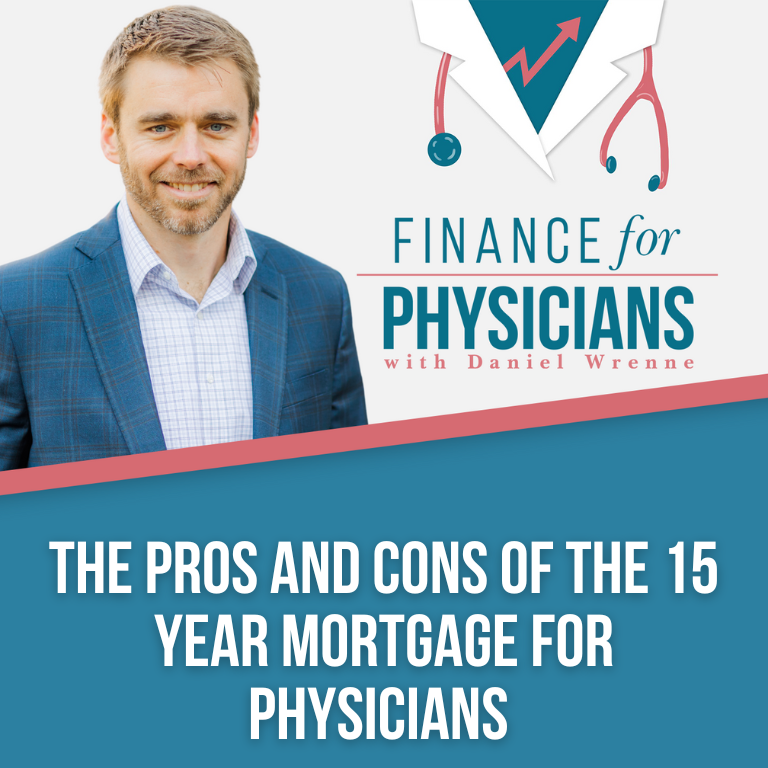Q: What are the pros and cons of the 15 year mortgage for physicians or other high income professionals?
Many physicians and their advisors fail to give the 15 year mortgage a fair shake. Here are the pros and cons…
The Pros
Forced wealth building
Your odds of having more wealth 15 years from now are considerably higher if you opt for the 15 year mortgage over the 30 year mortgage. The disciplined analytic would immediately object and claim you’ll actually be wealthier going with the 30 year and investing the difference. The numbers will typically agree but the numbers miss one massive factor. It’s exponentially harder to make your required mortgage payment AND invest an equal amount systematically over 360 months than it is to make your required mortgage payment for 180 months.
Even the most disciplined people miss a month here and there every couple years. The numbers don’t look so pretty when you opt for the 30 year and spend the difference, even if it’s only a fraction of the difference. There are other important and more complex errors we regularly see people making in this analysis which you can read more on in this Nerds Eye View article.
Less interest paid
The 15 year mortgage will save considerable interest over to the 30 year. This is a sure bet. Most people would be excited to get a guaranteed 4% on their investment. Yet they stretch their mortgage out as long as humanly possible. Why not pay more toward the mortgage and consider those payments to be your conservative investment allocation. If your considering physician mortgage loans, you should check this guide out first before going down that path.
Faster path to true ownership
It’s not always about the numbers. Although hard to quantify, there is a major qualitative benefit associated with true home ownership that should not be overlooked. Ask anyone you know that owns their home outright how they feel about it. True home ownership comes with additional security and financial peace.
Greater future cash flow flexibility
The 15 year mortgage will be paid off sooner than longer term mortgages. Once it’s paid off, monthly required expenses instantly decrease. Not having a mortgage provides much greater cash flow flexibility which can be especially appealing when you’re retired and living off your assets.
The Cons
Weak creditor protection in many states
In some states, the equity in your home is not protected fully from creditors. The 15 year mortgage will cause you to build equity in your home faster than the 30 year mortgage. Therefore if you’re in a state with weak creditor protection on homes, you should take that into consideration when comparing the 30 and the 15 year mortgage. If this is of concern, you should see legal counsel on the matter.
Less interest deduction
The 15 year mortgage will require less interest than the 30 year mortgage. Most physicians are able to deduct some or all of their mortgage interest on their taxes. Therefore, the 15 year mortgage will result in more income tax paid compared to the 30 year. The specific differences will depend totally on your circumstances. However in every case, the tax savings will never totally offset the interest. And at the end of the day, after you net out the tax differences, the 15 year still results in less total interest.
Less to invest
Monthly principal and interest payments will be higher with the 15 year compared to the 30 year mortgage. As a result, you’ll have less to invest (or spend). This will reduce your ability to build wealth in the alternative investment. However, it will also increase the pace at which you build home equity. And this gets back to our first point. Investing systematically requires much more discipline than paying a required mortgage payment.
Less cash flow flexibility today
This alone can be a deal breaker. If you opt for the 15 year mortgage, will you be forced to reduce savings? Is the required payment of the 15 year mortgage going to restrict your ability to make ends meet? If so, stay away from the 15 year mortgage. And consider this a sign you’re spending too much on the home no matter which mortgage you take on. When considering buying a home, you should be able to live your ideal life AND afford the 15 year mortgage OR the 30 year mortgage. The choice between the two should really come down to other pros and cons. Avoid going with the 30 year simply because it’s the only option you can afford.
At the end of the day, it really depends on your goals and circumstances.
